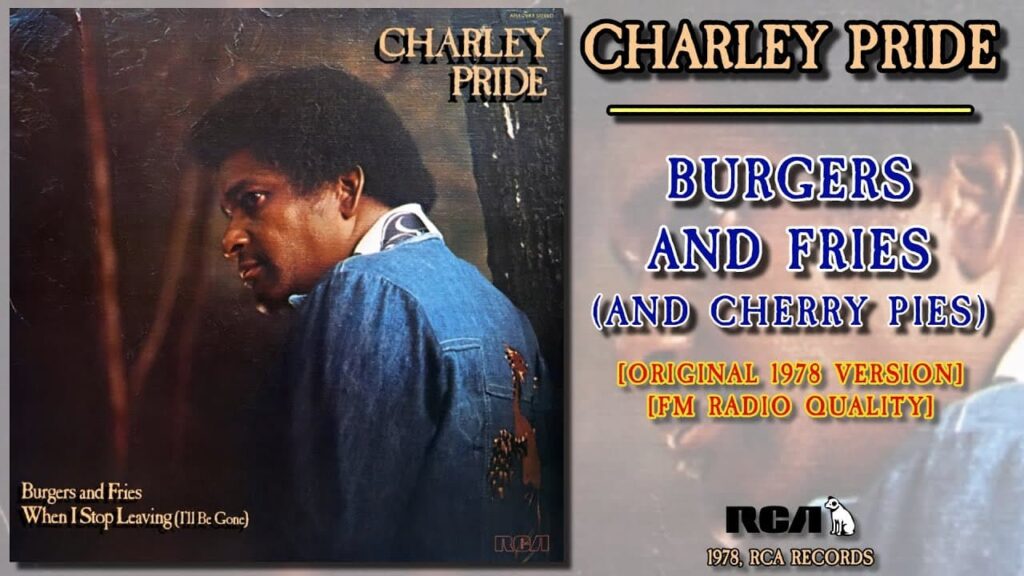
A tender reflection on love, innocence, and the passage of time—served with a side of nostalgia.
When Charley Pride released “Burgers and Fries” in August 1978, few could have predicted that such a simple title would hold such emotional depth. Written by Ben Peters and featured on Pride’s album Burgers and Fries / When I Stop Leaving (I’ll Be Gone), the song reached No. 2 on the Billboard Hot Country Songs chart and remained there for weeks, becoming one of Pride’s most beloved late-career hits. Behind its seemingly modest imagery lies a beautifully wistful meditation on youth, love, and the slow fading of innocence that touches anyone who has ever looked back and wondered where the years went.
“Burgers and Fries” is not a song about food—it’s a song about remembering the simple days, the quiet moments that once defined what love felt like. From the very first line, Pride’s warm baritone carries the listener into a time when happiness was uncomplicated: “Burgers and fries and cherry pies—it was simple and good back then.” With his trademark sincerity and restraint, he transforms a nostalgic picture of 1950s Americana into a gentle elegy for lost tenderness. It is a love song disguised as a memory, a photograph set to melody.
At the time of its release, Pride was already one of country music’s most consistent hitmakers, with twenty-three No. 1 singles behind him. Yet “Burgers and Fries” marked a subtle evolution in tone. The late 1970s were an era when the Nashville sound had become slicker, the arrangements smoother, and many artists chased pop crossovers. But Pride, true to his quiet grace, delivered a song that relied not on production but on emotion. The soft steel guitar, brushed percussion, and the barely-there backing vocals allow his voice to remain front and center—steady, comforting, and undeniably human.
The song’s creation came from Ben Peters, who had written several of Pride’s earlier hits, including “Kiss an Angel Good Mornin’.” Peters captured that universal longing to return to a time when love was new and unspoiled, when the world seemed as bright as the neon lights of a diner at night. Pride, with his natural gift for understatement, turned those lines into something almost cinematic. One can picture it clearly: a young couple sitting in a parked car, sharing cherry pie and laughter, believing that what they had would last forever.
But as the years pass, life takes its turns, and the narrator realizes that what once seemed endless has quietly slipped away. When he sings, “We used to love just like that,” there’s no bitterness—only a deep, resigned understanding. That is the heart of the song: a mature acceptance that time changes everything, and yet some part of us keeps reaching back to the sweetness of the beginning.
For many listeners who first heard “Burgers and Fries” in 1978, the song felt like a mirror. It wasn’t about teenage love anymore—it was about looking back from middle age, from marriages tested and memories softened by distance. It became a favorite on country radio, not because it was flashy or innovative, but because it felt true. Pride’s honesty, his humility, and his deep emotional clarity gave the song a life far beyond its chart run.
“Burgers and Fries” remains one of those rare country songs that manages to be both specific and universal. It evokes an era—drive-ins, jukeboxes, Friday nights—but it also transcends time. Its melody, gently swaying and instantly memorable, captures the rhythm of remembering: slow, tender, and tinged with melancholy.
Over the decades, the song has aged gracefully, much like the voice that gave it life. It invites listeners to pause, to sit with their own recollections, to find comfort in the thought that the simple joys of youth—however fleeting—were real and mattered deeply. Pride didn’t just sing about love; he sang about life as it is lived, one quiet realization at a time.
And that’s the beauty of “Burgers and Fries”: it reminds us that sometimes the greatest treasures of our lives are the smallest moments—the ones we didn’t recognize as precious until they became memories.